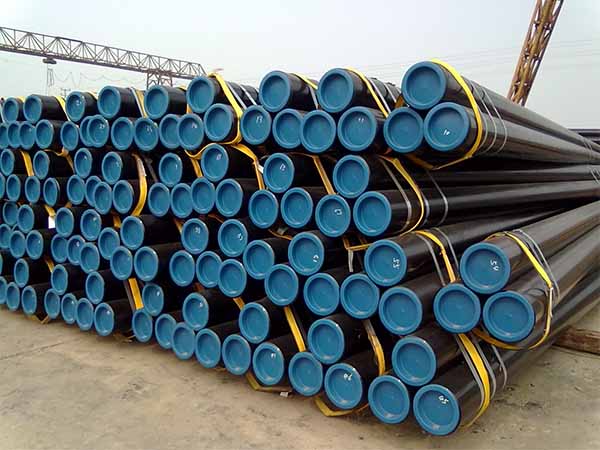
API 5L line pipes can be divided into two categories:
Seamless pipes: formed by heating and piercing round steel, hot rolling, or cold drawing, suitable for high pressure and harsh environments;
Welded pipes: mainly made by rolling and welding steel plates, including: ERW high-frequency resistance welded pipes, LSAW straight seam submerged arc welded pipes, and SSAW spiral submerged arc welded pipes.
API 5L is divided into multiple grades according to steel grade to reflect tensile strength and yield strength:
|
Grade |
Minimum Yield Strength (MPa) |
|
Grade A / B |
195–245 |
|
X42 / X46 |
290–320 |
|
X52 / X56 |
360–390 |
|
X60 / X65 |
415–450 |
|
X70 / X80 |
485–555 |
|
X90 / X100+ |
≥620 |
API 5CT casing and tubing
API 5CT is primarily used for oil well casing, production tubing, and drill pipe protective sleeves.
Common steel grades: J55, K55, N80, L80, C90, T95, P110, Q125;
Features: Must possess excellent resistance to hydrogen sulfide (H₂S) stress corrosion cracking, suitable for high-temperature and high-pressure downhole environments.
Common connection types: BTC (round thread), LTC (long thread), STC (short thread), Premium Thread (high-sealing thread).
API 5D drill pipe standard
API 5D specifies drilling pipe requirements:
Extremely high fatigue strength and torque capacity; Critical components (such as joints and weld zones) undergo special heat treatment;
Common steel grades: E75, X95, G105, S135 (numbers indicate minimum tensile strength ksi).
The special properties of drill pipes require extremely high strength, flexibility, and durability to withstand the high stresses generated during operation.
Applications of API pipelines
API pipelines, with their excellent strength, corrosion resistance, and reliability, are widely used in various energy and engineering transportation systems, including:
Long-distance oil and gas trunk lines
Submarine pipelines and offshore oil and gas gathering systems
Urban gas transmission and distribution networks
Chemical and petrochemical media transportation
High-pressure and cryogenic engineering applications
Engineering in complex geological and special environments
Summary
API pipelines, with their high strength, corrosion resistance, and stable performance, have become the primary choice for global oil, gas, and fluid transportation projects. Through stringent API standards, different types of pipelines can meet the needs of onshore, offshore, and complex environments, providing reliable guarantees for the safety and efficiency of energy transportation.